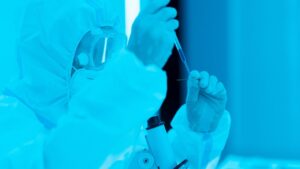The Recce Pharmaceuticals director that bet the house and it’s paying off

Pic: Godji10 / iStock / Getty Images Plus via Getty Images
Recce Pharmaceuticals (ASX:RCE) executive director James Graham, 30, famously put his $100,000 house deposit into the drug company now at the forefront of the war on the Coronavirus.
His investment appears to be paying off big time, with the company’s shares closing 54 per cent higher on Thursday at $1.05.
Recce Pharmaceuticals (ASX:RCE) share price chart:
Graham is the third largest investor in Recce with a 4.5 per cent holding and this is valued at approximately $6.4m, based on ASX market data showing Recce has a market cap of around $143m.
Originally from Perth, Graham said he was inspired to invest in Recce because of the work of its founder, Dr Graham Melrose. “I first invested to support his research,” he said.
A former head of research at Johnson & Johnson for Asia, Dr Melrose retired from the company a few days ago, James said.
Recce is also short for reconnaissance, and like the military term the company’s products find and eliminate a biological enemy, in this case viruses, he said.
Share price run
Recce shares went for a run yesterday after the company told investors two of its compounds had been selected for Coronavirus testing.
One of the compounds is among only few qualified treatments for sepsis or blood poisoning that also has a great capability against a broad range of superbugs, Graham said.
“This is a synthetic compound which is a class of antibiotic or anti-infection drug. They are the first new class in 30 years,” he said.
“Investors are increasingly aware of the value of new medicines.”
The two compounds will be tested against COVID in an anti-viral screening program being conducted by the CSIRO and Melbourne University’s Doherty Institute.
The SARS-CoV-2 Anti-viral Screening Program is part of Australian government efforts to identify promising anti-viral drugs and fast-track research into potential treatments for COVID-19.
Stopping hyper-mutation
The ASX announcement said Recce’s 327 and new 529 compounds were selected for their unique mechanism of actions against hyper-mutation, as indicated in bacteria and viruses.
Recce 327 is a broad-spectrum antibiotic formulated using synthetic polymer technology to treat blood infections and sepsis derived from E.coli and S.aureus bacteria, including their superbug forms.
Recce 529 is a new synthetic polymer formulation built upon the company’s anti-infective expertise.
The two synthetic anti-infective drugs are in the Priority 1 candidate group for the research, which is defined as “highest or strong likelihood of anti-viral or antiseptic efficacy”.
Related Topics

UNLOCK INSIGHTS
Discover the untold stories of emerging ASX stocks.
Daily news and expert analysis, it's free to subscribe.
By proceeding, you confirm you understand that we handle personal information in accordance with our Privacy Policy.








